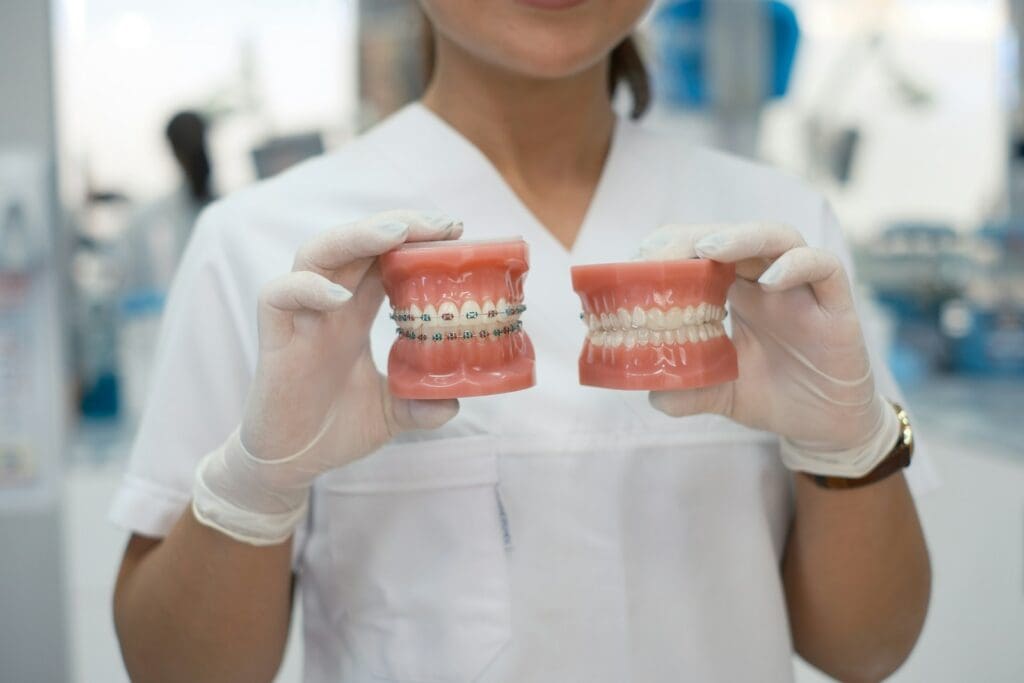
Orthodontist vs. General Dentist – Selecting the Appropriate Dental Care Provider
Navigating the world of dental health can be complex, particularly when deciding between an orthodontist and a general dentist for dental care. These professionals cater to different aspects of oral health, and understanding their unique roles is crucial in making an informed decision. A general dentist is akin to a primary care physician, focusing on overall oral health, regular maintenance, and minor dental procedures. They are typically the first point of contact for routine check-ups, cleanings, and basic restorative work such as fillings or crowns.
In contrast, an orthodontist specializes in the alignment of teeth and jaws. They have additional training to diagnose and treat bite irregularities, misaligned jaws, and crooked teeth. Orthodontic care often involves appliances such as braces or clear aligners to correct these issues over time. Patients with concerns about the aesthetics and functionality of their bite may find that an orthodontist has the specialized expertise to address these complex problems.
Choosing the right specialist requires a clear understanding of one’s dental needs and the services each professional offers. Patients seeking cosmetic or structural correction to their teeth alignment should consult with an orthodontist. However, for general dental maintenance or less complex dental concerns, a general dentist is typically well-suited to provide the necessary care. The decision hinges on a patient’s specific dental health objectives and the recommendations of dental health professionals.
Understanding Dental Specialties
When considering dental care, comprehending the specific roles and expertise of orthodontists and general dentists is crucial in making an informed decision for individual dental needs.
Differences Between Orthodontists and General Dentists
Orthodontists specialize in correcting teeth and jaw alignment, utilizing braces, clear aligners, and other corrective appliances. General Dentists provide a wide range of services that are not limited to orthodontics; they focus on overall dental health, including preventive care, diagnosis, and oral treatment.
Training and Qualifications
Both specialities require a Doctorate in Dental Surgery (DDS) or Dental Medicine (DMD) from an accredited dental school. Orthodontists receive further specialized training through a residency program, typically two to three years, focusing on alignment procedures, orthodontic hardware, and facial growth patterns. General Dentists might receive basic orthodontic training but do not possess the extensive specialty training of an orthodontist.
Scope of Practice
The scope of practice for General Dentists typically includes cleanings, fillings, crowns, veneers, and sometimes basic orthodontic care. Orthodontists, however, are trained exclusively in the manipulation of teeth and jaw alignment, dealing with complex orthodontic cases and malocclusion correction. They do not provide general dental services like fillings or cleanings.
Assessing Your Dental Needs
Choosing the right dental professional starts with understanding one’s specific dental health requirements. Whether it’s routine care or specialized treatment, identifying the need is the first step.
Common Dental Issues and Treatments
Various dental problems necessitate different approaches. Cavities, for instance, are typically addressed with fillings, while more extensive decay may require crowns or root canals. Gum disease ranges from mild gingivitis to severe periodontitis, with treatments including professional cleanings, scaling and root planing, or in advanced cases, surgery. Early intervention is key in managing such conditions effectively.
When to See a General Dentist
One should visit a general dentist for routine dental care such as:
- Biannual Cleanings: To prevent plaque buildup and detect early signs of decay.
- Dental Examinations: Regular check-ups to monitor dental health.
- Fillings: To treat cavities and restore tooth integrity.
- Crowns and Bridges: To repair and protect damaged teeth or replace missing ones.
General dentists are also skilled in diagnosing various conditions and can refer patients to specialists when needed.
When to Consult an Orthodontist
An orthodontist specializes in correcting irregularities of the teeth and jaw, typically through the use of braces, clear aligners, or other corrective devices. Consider an orthodontist consultation when facing:
- Misaligned Teeth or Bite Issues: To discuss braces or aligners for straightening.
- Jaw Growth Problems: For intervention that can influence jaw development.
- Complex Orthodontic Needs: Such as severe malocclusion or pre-surgical orthodontic treatment.
Orthodontists focus on properly aligning teeth and jaws for functional and aesthetic benefits.
Factors to Consider When Choosing a Specialist
When selecting between an orthodontist and a general dentist, patients should evaluate the complexity of their dental needs, listen to professional referrals and recommendations, and consider their insurance coverage and cost implications.
Complexity of Dental Condition
Patients must assess the complexity of their dental condition. Orthodontists specialize in correcting irregularities of the teeth and jaw, particularly using braces, aligners, and retainers. They are the go-to specialists for issues such as misaligned teeth, bite problems, and malocclusion. On the other hand, general dentists provide broad care, including cleanings, fillings, crowns, and preventive education. If a patient’s condition is beyond the scope of general dentistry, a referral to an orthodontist is necessary.
Referrals and Recommendations
It’s advisable for patients to seek referrals and recommendations from their general dentists, who can provide trustworthy information on whether their dental issues require an orthodontist’s intervention. Additionally, patients should also consider testimonials from past patients, as these can offer insight into the quality of care and patient satisfaction related to specific specialists.
Insurance and Cost Considerations
Understanding insurance and cost considerations is crucial in decision-making. Patients should verify which services are covered under their dental insurance plan and if an orthodontist or dentist is within their network. The cost of orthodontic work can be significant, so patients need to be clear on what expenses they’ll be responsible for and consider available payment plans or financing options.
Preparing for Your Consultation
Before arriving at your dental specialist consultation, it’s crucial to be well-prepared. This preparation will help ensure that you make the most informed decision regarding your oral health care provider.
Questions to Ask the Specialist
- Credentials: Ask about their qualifications, such as where they received their dental training and if they are board-certified in their specialty.
- Experience: Inquire about how many years they have been practicing and their experience with cases similar to yours.
- Treatment Options: Discuss the different treatment options available and the pros and cons of each.
- Costs and Payment Plans: Understand the costs of the proposed treatment and whether they offer payment plans or accept insurance.
- Expected Outcomes: Ask about the success rates of your treatment options and what to expect in terms of outcomes.
- Follow-up Care: Learn about the follow-up care process and what commitment is required from your side.
What to Expect During Your Visit
- Examination: Expect a thorough examination of your teeth, mouth, and possibly x-rays.
- Treatment Plan Discussion: The specialist will discuss a personalized treatment plan based on the examination findings.
- Time Frame: You will learn about how long the treatment is expected to take.
- Next Steps: Before you leave, you should have a clear understanding of the next steps and any preparations required for them.



